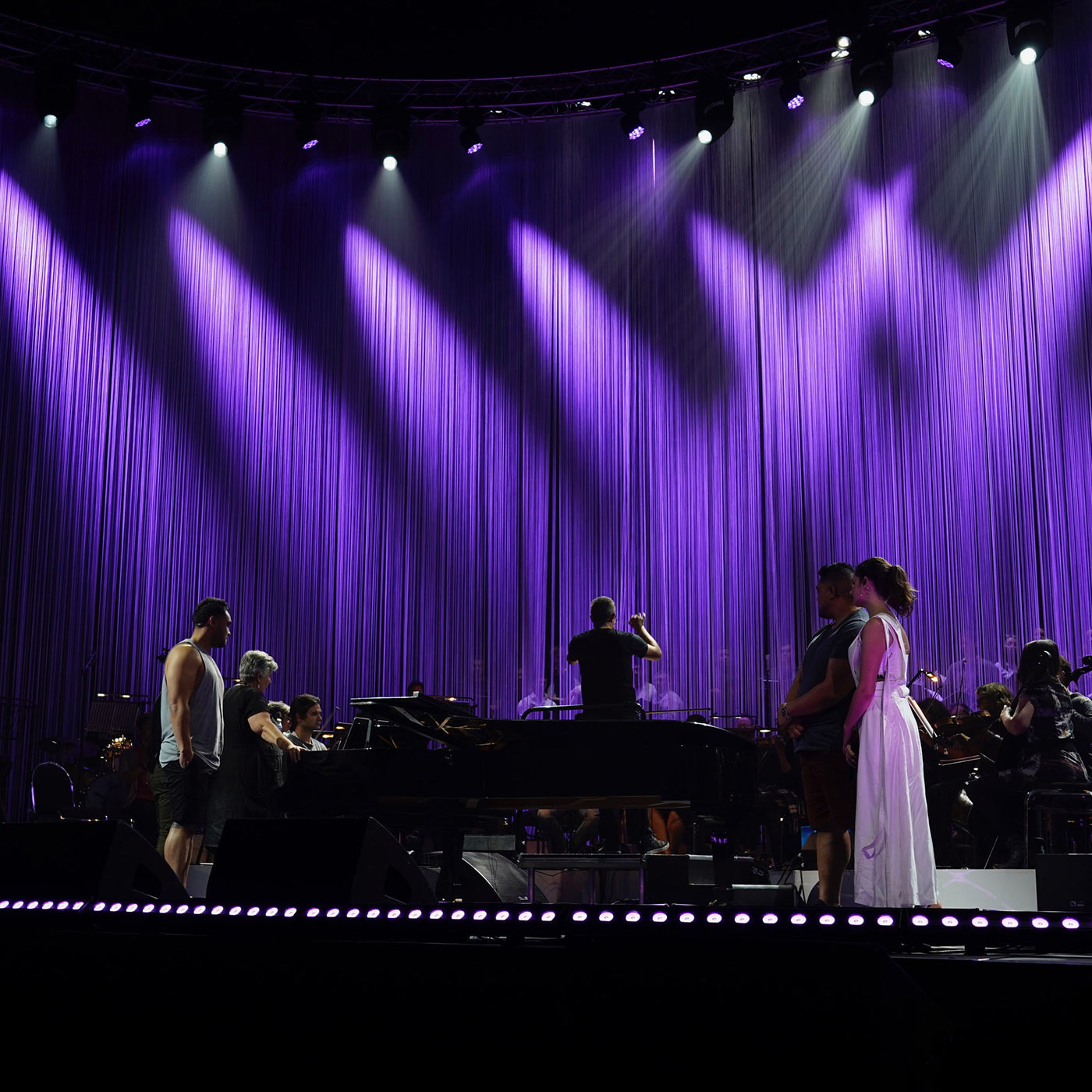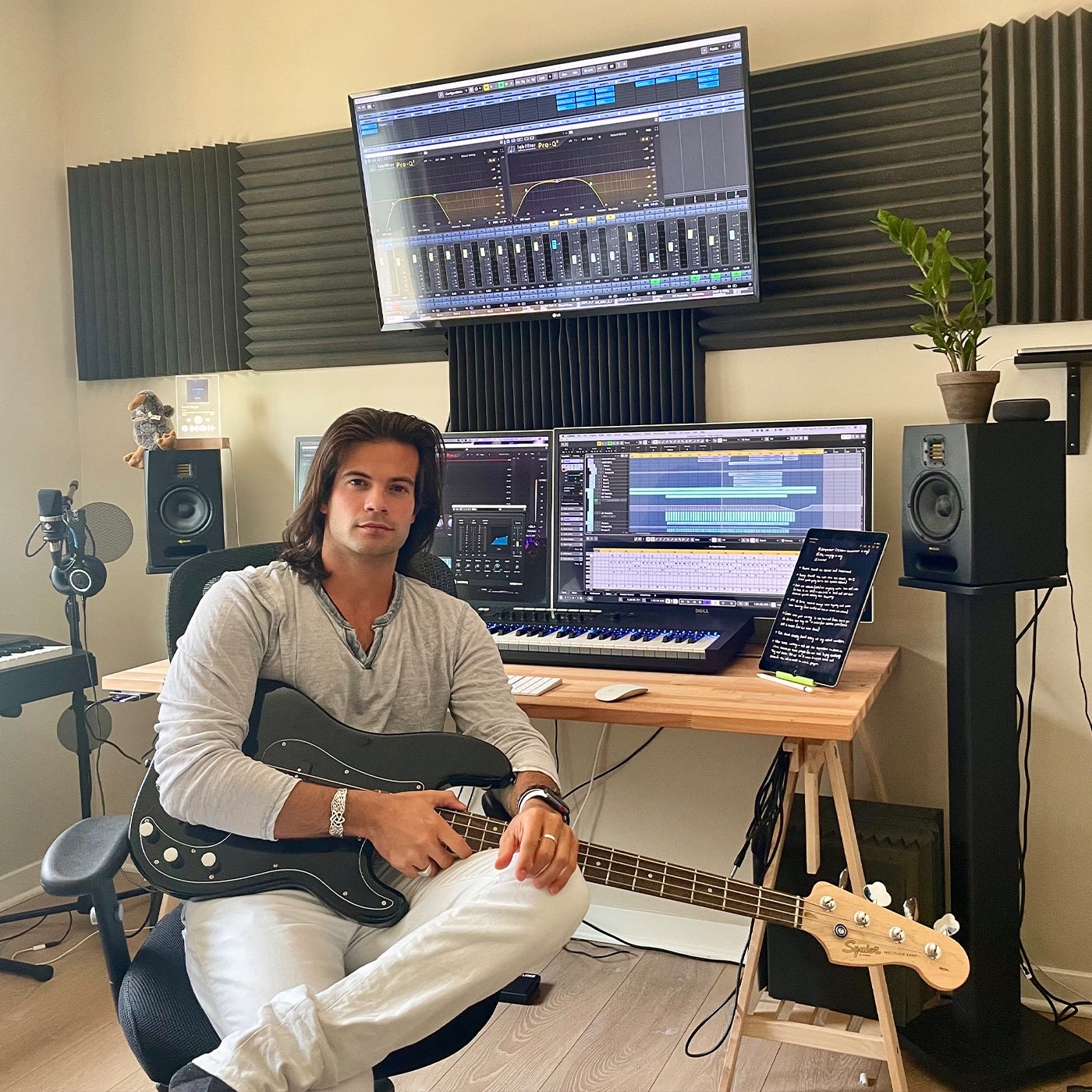Profile
Hollywood to Queenstown: young composer is opening doors
Music graduate Josh Romero is forging a successful career in the competitive Hollywood film industry – and pays tribute to the influence of his University of Otago teachers.
“I'm trying to give them hope.”
This was Otago music graduate Joshua Ryan Romero's mission when recently speaking to performing arts students at the University of Otago's Dunedin campus and at local schools.
And Romero is well qualified to be imparting that message. The young composer and producer has broken into the vast Hollywood film industry, forging a successful career composing music for film trailers in Los Angeles (LA). Romero studied composition and piano performance at Otago, graduating with a MusB (Hons) in 2014.
“I wanted them to know that the music industry is gasping for new talent,” says Romero, who arrived back in New Zealand last year two hours before the borders closed. He has now returned to LA, after spending over a year creating music and discovering new opportunities for his work in New Zealand.
“If you want to do it badly enough, and you just keep pushing through… then it's an open door.”
There is one caveat, however. “It has to be for the right reasons. If you go in to this industry just to be rich and famous, you'll hit dead ends very quickly. If you do it for the love of it, which I think is the reason most people study music, then the sky is the limit.”
Romero was born in Italy, to Spanish and American parents, and his childhood included growing up in Italy, the US, UK and ultimately New Zealand, initially in Auckland, but the family moved to Queenstown when Romero came to Otago.
He credits the influence of his Otago teachers for his success and development as a musician, highly praising Professor Terence Dennis who instructed him through his piano performance major, Associate Professor Peter Adams and Professor Anthony Ritchie in composition, Tessa Petersen and Heleen du Plessis in instrumentation, Dr Ian Chapman in song writing, and Dr John Egenes in music technology.
“It was a very eclectic environment; you learned about musicians from all over the world and different cultures. Not one teacher ever told me I should do something else or go into a certain field of music: it was a very cultivating atmosphere.”
“If you go in to this industry just to be rich and famous, you'll hit dead ends very quickly. If you do it for the love of it, which I think is the reason most people study music, then the sky is the limit.”
After finishing his degree, Romero spent a year working in hospitality and teaching in Queenstown. Then, through some contacts from Dunedin, he took up an internship in LA with a post-production music house, producing music for high-end advertising and commercial campaigns, writing for big brands such as BMW, Universal Studios and Macys. “The only thing I had was my passport. I didn't know anyone on the West Coast.”
He then spent the following three years writing and producing in his bedroom after working odd jobs day and night, sitting in on friends' writing sessions and networking as much as he could, before finally getting a breakthrough.
Through friends he met two musicians who had recently created a start-up, making trailers for studio movies – huge orchestral ensembles combined with electronic/hip-hop, R&B etc. – and was taken on as an assistant composer and intern.
“I was trained every day by mentors who had the time and patience to instruct and critique me. I still owe a huge chunk of my industry knowledge and musicality to them. They gave me the tools I needed to work high up in the industry – mainly consisting of production skills and mixing techniques, the 'how to' on making your music sound professional.”
After another year, Romero went out on his own and kept on networking. “Most of my friends were industry professional composers, so they could give me feedback that was 'real-world' relevant.”
In his fourth year in LA he and one of his closest friends and colleagues, an accomplished film composer in his own right, established an artist duo known as SAYSH, and began creating trailer music, combining their talents in film composition and production.
Long story short, a mutual friend put them in contact with a music licensing company who listened to their music and believed they had the potential to have their music in mainstream shows and movies.
“They had something like 70 artists on their roster and I think we were the only two that were classically-trained composers yet could also produce, so we had a bit of an edge. We have been placed in sessions with quite a few of their artists and we stand out because we can make them sound just as good in a sweeping orchestral section as well as epic electronic productions. This was the break that I needed.”

Josh Romero instructs the orchestra and soloists at a sold-out Vector Arena performance with Sole Mio and Anderson Rocio.
Photo: Wayne Pottow
The company started using their pieces of music, tracks two- to three- minutes long, and licensed them to Netflix, MTV, HBO, amongst other streaming platforms. From there, things start to gain momentum, as listeners would use the Shazam app to identify the songs from a particular scene, which would take them to Spotify or Apple Music or YouTube.
“And after a while the listens add up, so you earn money from each of the streaming platforms… and you can generate a pretty legitimate income.”
In the film and television industry, SAYSH's work has featured in the Netflix Anime series Dragon's Dogma, CW's Nancy Drew series, Batwoman, Selling Sunset and more to come.
When the pandemic hit, Romero's work was going well and he was “very apathetic” about returning home to Queenstown. But, again through networking, he has met a range of musicians and created a host of opportunities in the past year, to the point where he confesses to feeling conflicted at returning to the US.
“I'll miss my new friends and the artistic environments I have discovered whilst being home, however, I am excited to return to my life in LA.
“I have been pleasantly surprised at the talent and unique innovation of composers and musicians all around New Zealand. I felt relieved and excited at the concept of working from New Zealand as a more permanent option in the future.”
At a concert in Arrowtown featuring opera singer Simon O'Neill, he caught up with his former teacher Professor Terence Dennis, and was introduced to jeweller and entrepreneur Michael Hill. One thing led to another. “I got to be part of the musical environment in Queenstown, which is quite big actually, you just have to know where to look.”
He kept busy over the past year with projects involving the New Zealand Symphony Orchestra (NZSO), composing and arranging orchestra and choir for a sold-out performance in Auckland for Sole Mio, and arranging music for the Wakatipu Music Festival put together by the Michael Hill Foundation.
“One of their directors wanted me to arrange the Ode to Joy for a younger choir ensemble, so I had to write it out phonetically and try to make the music simpler to read. I had to write it out by hand, note by note, using my ear as much as my theory knowledge. I still get emotional reactions listening to great composers' popular works.”
During his time back home in New Zealand Romero also worked with travel photographer blogger Trey Ratcliff, who happened to live behind him in Queenstown. Romero is composing music to accompany Ratcliff's Machine Elf projects, incorporating 16- to 20-minute videos of computer-generated images – “like looking through a kaleidoscope” – backed by meditative music.
He has also been very impressed with the new Performing Arts facilities at the University of Otago and hopes to be able to use them in his work in the future, including in collaborations with the Dunedin Symphony Orchestra. He believes New Zealand has some of the best musicians in the world and was excited to discover that the technology the composers use in Europe and the US – which allows you to watch in real time your orchestra performing your work on the other side of the world – was available at the new Otago studio.
“The facility here is arguably one of the best I've seen, on par with many top studios in LA.
“I was invited to have a little tour of the new studio just before they opened it, all I could think was 'I can't wait to record here'.”
Romero also spent some time instructing piano in Queenstown and participated in the Vocational Pathways Seminar at the Dunedin Town Hall for several local high schools about career pathways in music and the arts, as well as speaking at the University.
“I meant to ask how many of the students study music or an art form as their major. A common reality is students study a minor in business, marketing, law or the sciences. I acknowledge that this is done largely for financial security reasons. These are noble career paths, but I think the humanities, the arts, music are kind of what makes life worth living. Pursuing this with the mind-set of 'I will succeed because I need to' and, in doing so reminding yourself not to fear failure. With a little patience, you're guaranteed to achieve success.”
MARGIE CLARK
John Romero: “I still get emotional reactions listening to great composers' popular works.”

